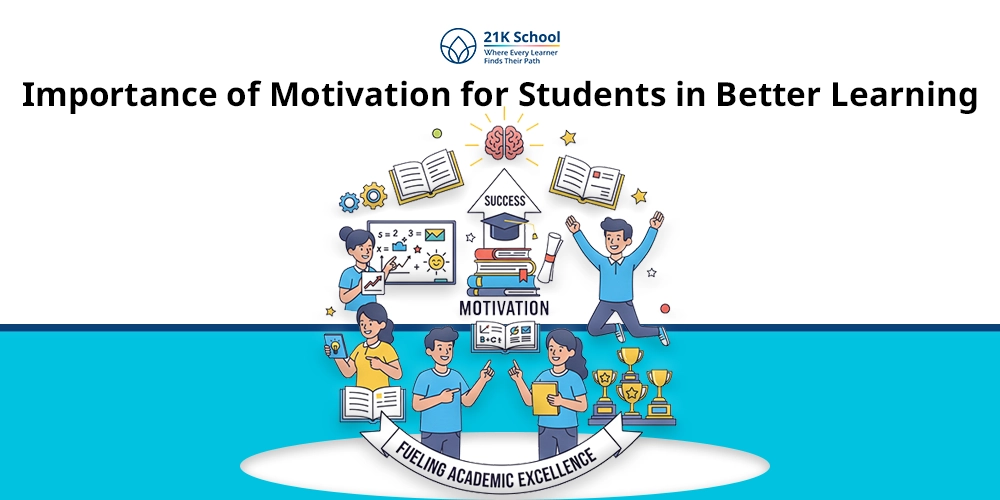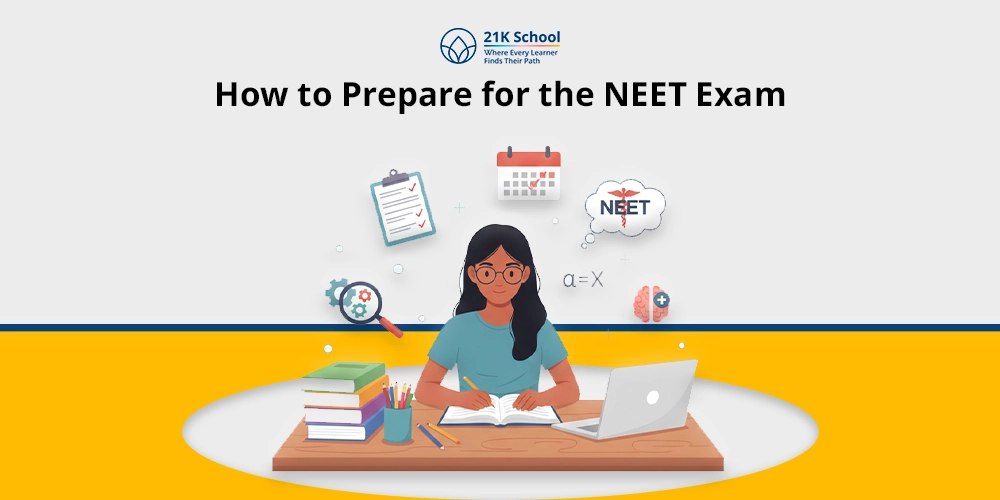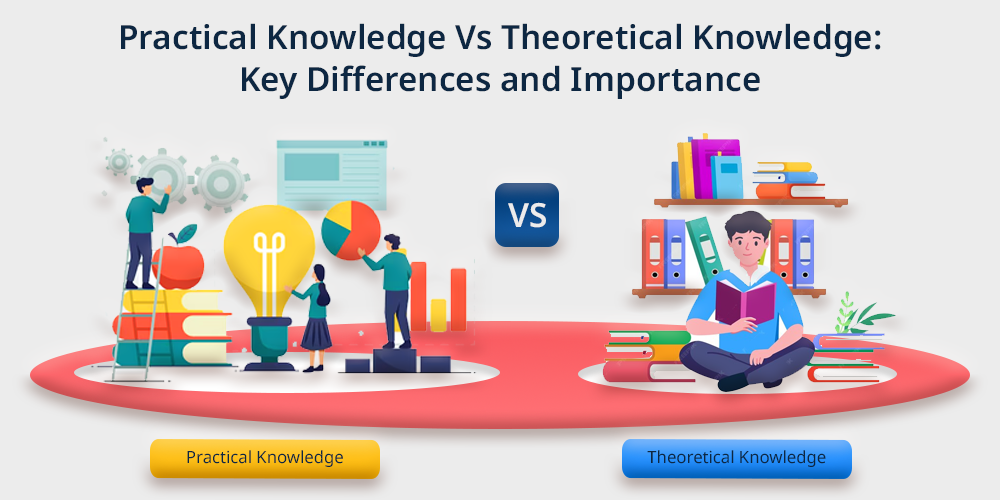
Have you ever wondered why practical knowledge has been given more priority than theoretical knowledge?
Theoretical knowledge and practical knowledge are both essential in today’s educational world.
In the 21st century, more focus was laid on practical knowledge, as it will help to understand the real world more closely; it also helps in achieving flow in education.
With time, the student learning process has undergone a significant change.
Instead of focusing on theoretical knowledge, education is now giving more importance to practical enhancement skills that help in developing a positive impact among students.
However, theoretical knowledge is also essential to develop the core knowledge or to build the foundation among children. Theoretical learning and practical learning are both different concepts but are related to each other.
Without theoretical knowledge, there are no practical skills, and without practical learnings, there will be no use for theoretical knowledge.
Contents
What is Practical Knowledge?
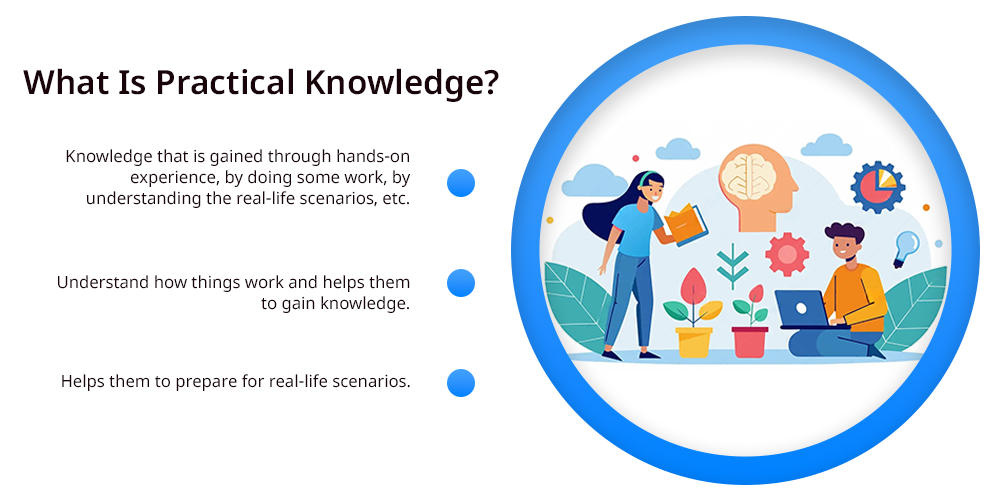
Practical knowledge is the process of gaining knowledge from practical experience. Practical knowledge is the type of knowledge that is gained through hands-on experience, by doing some work, by understanding the real-life scenarios, etc.
Practical learning helps students to understand how things work and helps them to gain knowledge by implementing their insights.
Practical education has more fun in learning which engages more students to learn. Learn practical knowledge is so different from theoretical learning, as this will help to prepare for real-life scenarios.
For example, if a student wants to learn how to ride a bike, his/her parents will give the instructions, but to learn the bike, he/she needs to apply the instructions into real-life scenarios, and hence, it becomes practical exposure.
Benefits of Practical Knowledge
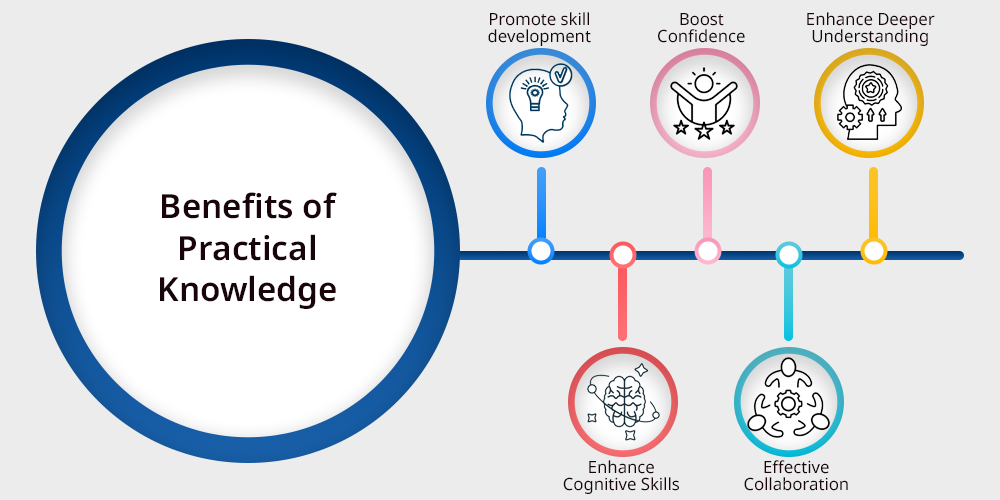
Practical knowledge is given more priority as compared to theoretical knowledge.
Practical knowledge is essential for children to understand the world more closely and gain hands-on experience. This also enables skill-based education among children’s.
It assists students in understanding the procedure of real-life exposure by implementing theoretical knowledge. Various benefits, such as effective collaboration, boosting mental health, promoting skill development, etc.
Here are the benefits of implementing practical knowledge
- Enhance Deeper Understanding: Practical knowledge helps children to understand the real world more closely. It offers them a practical insight that improves their overall educational experience. When children utilize their knowledge in practical circumstances, they transform into engaged learners instead of merely absorbing information.
- Boost Confidence: Practical knowledge helps students gain confidence by applying real-life practical skills. By practical learning, children will make mistakes, and by each mistake they will gain more confidence. Practical experience helps them to learn from their mistakes and create opportunities out of challenges.
- Promote skill development: Practical knowledge helps in developing skills that will be important for educational and professional goals. This offers real-life insights to children that help in their educational journey. Through real-life scenarios, children will become active receivers rather than passive receivers.
- Enhance Cognitive Skills: Practical learning helps in the cognitive development of kids . Through critical thinking, problem-solving, and decision-making skills, children become more prone to intellectual development. Through cognitive development, children develop their academic as well as professional goals.
- Effective Collaboration: One of the major benefits of practical skills is collaboration or teamwork among children. Through getting into practical workings, children learn about teamwork and collaboration. This helps to gain valuable understanding and helps in getting professional success.
What is Theoretical Knowledge?
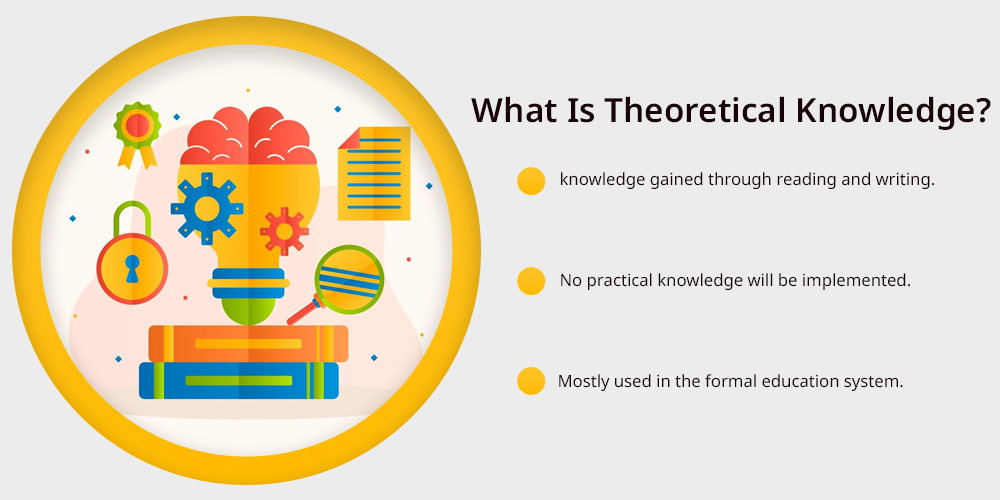
Theoretical knowledge can be defined as knowledge gained through reading and writing without having any practical experience. Without theoretical knowledge, no practical knowledge will be implemented.
Theoretical knowledge also promotes life-long learning , which is essential to make a career in academics.
Theoretical knowledge is mostly used in the formal education system and is provided through various resources such as books, digital platforms, videos, illustrations, etc.
Theoretical knowledge creates the foundation and gives a conceptual framework that helps in building practical experience.
Benefits of Theoretical Knowledge
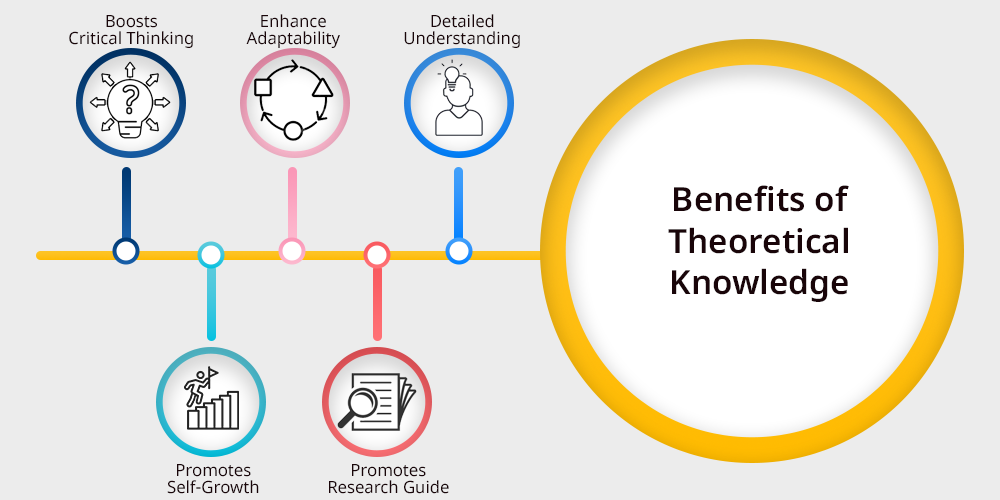
Theoretical knowledge is the base of any educational format. Through theoretical knowledge, students gain a deep understanding of any subject.
Theoretical knowledge is the basic understanding of detailed information that helps to develop creative thinking skills .
Theoretical learning helps to develop critical thinking, problem-solving abilities, self-learning, and so on.
Here, you can check the benefits of theoretical experience.
- Boosts Critical Thinking: Theoretical knowledge helps to develop critical thinking by providing the insights of root knowledge. Through theoretical knowledge, students can analyze and evaluate the information, which helps them find solutions to problems.
- Enhance Adaptability: One of the major benefits of theoretical knowledge is that it helps in adapting to new situations. By analyzing the core concepts, kids can change their adaptability according to the context.
- Detailed Understanding: Theoretical knowledge gives a detailed understanding of the information. Through theoretical learning, children can make relationships between different elements and enhance their academic as well as practical performance.
- Promotes Self-Growth: Unlike practical knowledge, theoretical learning helps in the growth of students. Through theoretical knowledge, kids will gain detailed information about the concepts. This allows children to have a valuable understanding of what is wrong and what is right and promotes holistic development.
- Promotes Research Guide: Theoretical knowledge gives a detailed guide about research programs. Theoretical knowledge helps in developing new knowledge and promotes positive utilization. For higher education, theoretical knowledge will be very helpful to get positive results.
Difference between Theoretical Knowledge and Practical Knowledge
Theoretical knowledge vs. practical knowledge both are always used to denote different concepts. Theoretical learning and practical learning are both co-related to each other.
Theoretical knowledge is the core of any concept, whereas practical learnings are based on real experience.
Both are essential for the consistent and professional development of the child. Both in academic as well as real-life, practical and theoretical experience plays a pivotal role.
Practical learning provides skill based education where as theoretical lessons focuses on detailed structured.
Below, you can check the detailed difference between theoretical knowledge and practical knowledge.
| Basis of Difference | Theoretical Knowledge | Practical Knowledge |
| Definition | Based on ideas, reading, and writing without implementing any practical skills. | Type of knowledge that is gained through hands-on experience |
| Involvement | It involves concepts and principles, theories, and books | It involves implementing knowledge in the real world by acquiring hands-on experience. |
| Implementation | Theoretical knowledge is implemented in research papers, guiding principles, core structures, and so on. | Practical knowledge is implemented in every aspect of real-life scenarios. |
| Correlation | Without theoretical knowledge, there will be no use of practical skills, and they correlate to each other. | Practical knowledge creates practical solutions by understanding the core of theoretical knowledge. |
| Acquistion | Theoretical knowledge is gained through books, research, pieces of literature, educational materials, etc. | Practical knowledge is gained through real-life exposure or hands-on experience. |
| Focus | Theoretical knowledge focuses on understanding the principles and concepts behind any subject. | Practical knowledge focuses on real-world situations or converting theories into practical realism. |
| Example | Understanding the principles and mechanics of riding a bicycle is theoretical knowledge. | Understanding how to ride a bicycle is practical knowledge by applying hands-on execution. |
Conclusion
In the educational landscape, both theoretical and practical knowledge are essential, and each makes a distinct contribution to a student’s growth.
Practical knowledge acquired via first-hand experience improves comprehension, increases self-assurance, and fosters vital abilities like teamwork and critical thinking.
It makes learning more interesting and applicable by preparing students for real-world situations. However, theoretical knowledge offers the fundamental structure required to comprehend difficult ideas, encouraging reflection, flexibility, and personal development.
Students are given the resources they need to thrive academically and professionally when these two types of knowledge are combined to form a comprehensive educational experience.
It is crucial to highlight the interdependence of theoretical and practical education in order to develop well-rounded people who can handle the difficulties of the twenty-first century.

